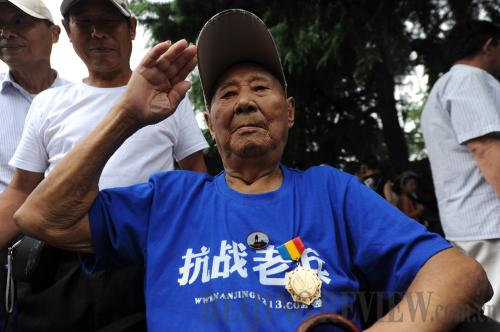|
 |
|
HISTORY WITNESS: Liu Guiying, a 94-year-old veteran soldier of the anti-Japanese aggression war, makes a military salute during a commemorative event in Hefei, Anhui Province, on July 7 (MA QIBING) |
During World War II, the Japanese army invaded China and a number of Southeast Asian countries, causing immeasurable damage to all Asian people. Civilians were killed by gunfire, bombs, gas and biological weapons; women were raped; and forced laborers were tortured to death.
Li Buhong, from De'an County in central China's Jiangxi Province, is among the dwindling ranks of Chinese veterans who fought in the war against Japanese aggression. He was 13 when the Lugou Bridge Incident broke out and joined the army five years later.
"I have seen the cold-blooded, inhuman violence the Japanese invaders committed toward my countrymen," said Li, now 90. "Now they want to deny their invasion. That's senseless."
Zhou Yongsheng, a professor of Japanese studies at China Foreign Affairs University in Beijing, said, "Our choice in remembering history is not to add fuel to hatred but to avert the historical tragedy from happening again."
Even greater evidence
Pan Xun, a professor at Chongqing-based Southwest University, calls for increased research and protection of historical records from the 1937-45 period to thwart the Japanese right-wing's attempts to distort the country's history of aggression.
"More people, including the Japanese, should learn from history, and face up to history, so that we can understand the brutality of war," Pan said.
Starting from July 3, the State Archives of China began releasing confessions by 45 Japanese war criminals, who were tried and convicted by military tribunals in China after World War II.
The archives include original written confessions, supplements, corrections, postscripts, as well as Chinese translations with abstracts. The original materials amount to more than 200,000 pages.
The one released on July 7 was the written confession of Tsutomu Nagashima, commander of the 54th Brigade of the 59th Division of the Japanese Army from 1942 to 1945. Japanese troops under the command of Nagashima conducted 15 battles, killing 1,660 Chinese soldiers and 970 civilians, as well as burning down over 2,220 civilian houses, from April 1942 to July 1945, according to his confession.
Feng Wei, a professor of Japanese history studies at Fudan University in Shanghai, said that the evidence is undeniable, and it is time for people to "bring an end to the appalling rush of Japanese lawmakers continually denying the country's wartime deeds."
On July 7 and 8, the Memorial Hall of the Victory of the Anti-Japanese War and the Acceptance of the Japanese Surrender in Zhijiang, central China's Hunan Province, also released several videos of the first major Japanese surrender in China on August 21, 1945. The event took place at Zhijiang Airfield and marked the end of the war of anti-Japanese aggression in China. This is the first time that China has released the historic clips, which were shot by Americans and provided by the U.S. National Archives.
In addition, the National Memorial website was officially launched on July 6 in Chinese, Japanese and English.
The website, which is in black and white, catalogues the history of China's anti-Japanese aggression war, commemorates the dead and spreads knowledge about national memorial activities.
"The website will help Chinese across the world and our peace-loving international friends to better know history and remember the victims anytime and anywhere," said Zhu Chengshan, Curator of the Memorial Hall of the Victims in the Nanjing Massacre by Japanese Invaders.
Email us at: yuanyuan@bjreview.com | 